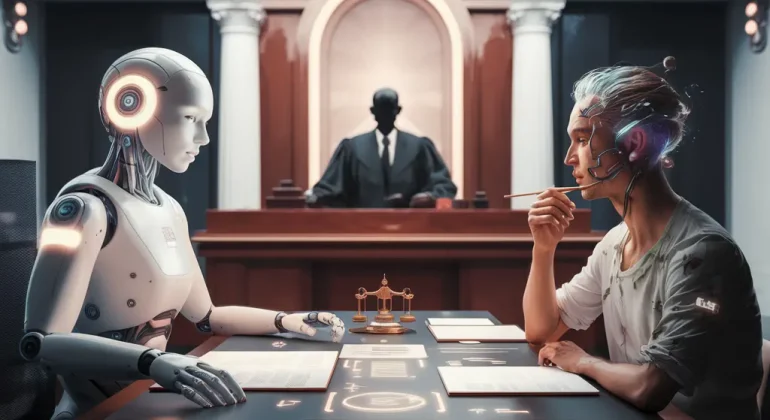Sommaire
The evolution of AI and Copyright
The United States Copyright Office has released the second part of its comprehensive study on artificial intelligence and copyrightability. This latest report, dated January 29th 2025, titled “Copyright and Artificial Intelligence, Part 2: Copyrightability“, delves into one of the most contentious legal questions of the modern digital era: Can AI-generated content receive copyright protection?
As AI tools like ChatGPT, MidJourney, and DALL·E continue to evolve, artists, musicians, and content creators are leveraging these technologies to assist in their creative processes. However, where does the boundary between human creativity and AI automation lie? This report provides critical insights into how the U.S. Copyright Office currently addresses AI-generated works and their copyrightability.
Background: A recap of Part 1 – Digital Replicas
Before discussing AI-generated works, it is essential to recall the findings from the first part of the U.S. Copyright Office’s AI report, which focused on digital replicas (e.g., deepfakes and AI-generated voices). Key takeaways from Part 1:
- Digital replicas (AI-generated likenesses of individuals) raise significant legal and ethical concerns.
- The report emphasized the lack of clear legal frameworks to address the unauthorized replication of an individual’s image or voice.
- The Copyright Office recommended further legislative action to protect against AI-generated deepfakes and potential misuse of identity rights.
With Part 2, the focus has now shifted to an equally pressing issue: the copyrightability of AI-generated content.
AI-Generated works and copyrightability
The fundamental question addressed in Part 2 of the report is: To what extent can AI-generated content be considered copyrightable under U.S. law?
1 – Human authorship requirement
According to the U.S. Copyright Act, only works created by a human author qualify for copyright protection. The Copyright Office reaffirms this principle, stating that:
- Copyright protection does not extend to material generated wholly by AI.
- AI-assisted works may qualify for copyright protection if there is sufficient human involvement in the creative process.
- The determination of copyrightability will be handled on a case-by-case basis.
There is a key precedent: Thaler v. Perlmutter (2023) – The U.S. courts upheld that AI-generated works cannot be copyrighted, reinforcing the human authorship requirement.
2 – The role of AI in creativity
The Copyright Office differentiates between AI as a tool and AI as an autonomous creator.
- AI as an assistive tool meaning that if AI is used to enhance human creativity, the final work may be eligible for copyright protection.
- AI as an autonomous creator meaning that if AI produces a work without human creative input, it cannot be copyrighted.
For example: a human artist using Photoshop, AI-based filters, or generative AI as part of their creative workflow can still claim copyright. However, a fully AI-generated artwork created without human selection, arrangement, or modification is not copyrightable.
3 – The significance of prompts
One of the most controversial topics covered in the Copyrightability Report is whether AI-generated content based on human prompts qualifies for copyright protection.
The Copyright Office’s stance:
- Writing a prompt alone is not sufficient for copyright protection.
- Prompts must involve “sufficient creative expression” and “substantive human input” to be considered authorship.
- A person modifying, arranging, or selecting elements of AI-generated content may qualify for partial copyright protection.
Therefore, an AI-generated images or texts created using a prompt may not belong to the user unless they demonstrate clear human creativity in the final output.
4 – Legal analysis and international approaches
Different countries are addressing AI and copyright in varying ways:
- United States: AI-generated content is not eligible for copyright protection unless there is substantial human involvement.
- United Kingdom: AI-generated works may receive limited protection under existing copyright laws.
- European Union: The EU AI Act mentions the obligation for AI systems to comply with intellectual property rights.
- China: AI-generated works can be copyrighted, but liability and authorship rules remain ambiguous.
The lack of global harmonization in AI and copyright laws could create significant legal uncertainties for creators using AI worldwide.
Implications and potential legal changes
The Copyright Office recognizes the complexity of AI copyrightability and explores potential legal reforms, including:
- Clarification of “substantial human involvement” in AI-assisted works.
- New guidelines for AI-generated content registration.
- Possible introduction of a sui generis (unique) legal framework for AI-generated creative works.
However, the report does not recommend legislative changes at this time, instead emphasizing case-by-case assessments.
Conclusion: The Future of AI and Copyright
The U.S. Copyright Office’s second report on AI and copyrightability establishes that:
- AI-generated works are not independently copyrightable unless there is clear human authorship.
- Prompts alone do not establish copyright ownership.
- The legal framework remains flexible but requires further clarification.
As AI technology continues to evolve, creators, businesses, and policymakers must navigate an uncertain legal landscape.
Need expert guidance on AI and intellectual property? Dreyfus Law Firm specializes in intellectual property law, including trademark, copyright, and AI-related legal matters. Our experts stay ahead of AI and copyright developments!
Dreyfus Law Firm collaborates with a global network of IP attorneys to provide tailored legal solutions in the evolving field of AI and copyright.
Join us on social media !

